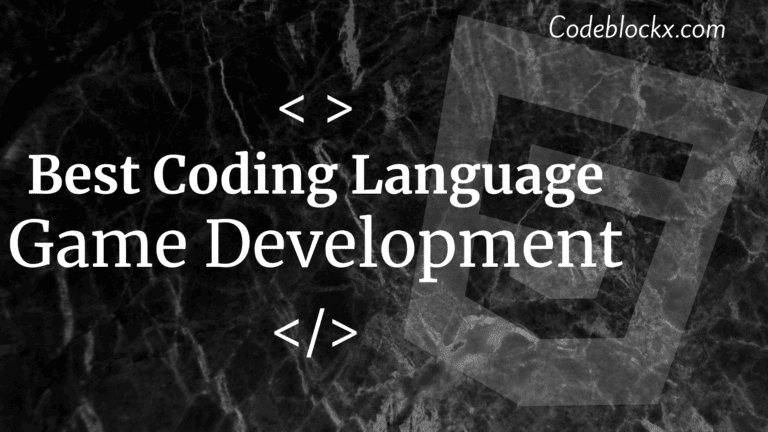Hey there, fellow gamers and aspiring game developers! Ready to embark on an epic quest into the captivating world of game development? Welcome to the realm where coding, magic, and creativity collide. In this article, we’ll dive into the enchanting world of game development and explore the best coding languages that will breathe life into your gaming ideas. Are you ready to wield the power of coding like a wizard?

Importance of Choosing the Right Coding Language for Game Development
Alright, let’s talk about the holy grail of game development – choosing the right coding language. It’s like picking the perfect wand to cast your spell. Your choice directly impacts how your game performs, how flexible it is, and whether it scales like a legendary dragon or flops like a soggy potion. Each coding language is like a unique charm, and you must learn its secrets to unlock its true potential.
Overview of the Top Coding Languages for Game Development
Alright, here comes the fun part! Let’s meet the rockstars of the game development world – the coding languages that bring games to life!
1. C++
C++ is the Gandalf of game development – wise, powerful, and time-tested. It’s the language behind many epic games, known for its high performance and low-level access to the hardware’s secret passages. With its object-oriented nature, organizing code is like arranging magical runes, making it perfect for massive projects.
2. C#
C# is like the trusty sidekick of game development, especially when paired with Unity, the ultimate game engine. It’s friendly, easy to use, and provides a robust framework for crafting 2D and 3D games alike. Unity and C# are like two peas in a pod, creating a harmonious symphony of game development goodness.

3. Java
Ah, Java, the versatile sorcerer of mobile game development! It’s like having a magical portal to multiple platforms, making it perfect for games that traverse realms. With its extensive libraries and frameworks, Java equips you with a treasure chest of tools to weave enchanting gaming experiences.
4. Python
Python, the friendly neighborhood wizard, is here to make game development a breeze. It’s all about simplicity and readability, allowing you to quickly conjure game concepts and prototypes with ease. Though it might not be the most performant, it excels in rapid development and scripting tasks.
5. JavaScript
JavaScript, the spellcaster of the web, has enchanted its way into the gaming world. With HTML5 and WebGL as its allies, JavaScript becomes a viable option for browser-based games. It is flexibility and extensive library ecosystem make it a versatile language for creating visually stunning and interactive games.
6. Lua
Enter Lua, the nimble sorcerer of game scripting and AI programming. This lightweight language is like the Swiss army knife of game development, used for scripting game events and AI wizardry. From Unity to Corona SDK, Lua finds its place in various magical realms.
Introduction to Game Engines and Their Role in Game Development
Alright, you’ve got your wand (coding language), but now it’s time to unleash the power of game engines! Imagine them as your magical cauldrons, brewing the perfect potion for your game.
1. Unreal Engine
Unreal Engine, the grand creation of Epic Games, is like a mythical artifact in the game development world. With its advanced graphics capabilities and robust physics simulation, it empowers developers to conjure visually stunning and immersive games. The blueprint system adds an extra sprinkle of magic, making game creation an enchanting experience.
2. Unity
Welcome to the realm of Unity, the versatile and friendly game engine. Whether you’re crafting 2D or 3D wonders, Unity’s user-friendly interface and vast asset store make game development a joyful journey. Cross-platform capabilities and built-in multiplayer support are like hidden treasures waiting to be discovered.
3. Godot
Behold, the open-source wonder of Godot! This magical game engine is renowned for its simplicity and flexibility, making it a favorite among indie game developers. The intuitive visual scripting system and powerful node-based editor are like spellbooks, empowering you to create games with ease
Key Aspects of Game Development
Alright, let’s dive deeper into the enchanted cauldron of game development. Here are some essential elements that shape the gaming experience:

1. 2D Games
Ah, the classics! 2D games encompass a range of genres, from platformers to puzzle quests. It’s like painting a magical canvas, mastering game design principles, sprite animation, and rendering techniques.
2. 3D Games
Enter the realm of 3D! It’s like creating a virtual wonderland, where players explore vast worlds. To master this realm, you’ll need to delve into 3D modeling, texturing, lighting, and even shader programming.
3. Game Programming
The heart of game development – game programming! It’s like crafting a spell from scratch, implementing gameplay mechanics, handling player input, and managing the game’s states. Mastery in coding languages, algorithms, and data structures is a must.
4. Game Design
Creating magical gameplay experiences is the essence of game design. It’s like penning a tale that captivates players’ hearts, designing levels, balancing difficulty, and ensuring a seamless player journey. Understanding player psychology and game theory adds the final touch of enchantment.
5. Game Mechanics
The rules that govern the game are the game mechanics. From character movement to combat, it’s like choreographing an epic dance of game interactions. Game developers must craft mechanics that reward players and keep them immersed in the magic.
6. Game Assets
Envision creating beautiful artwork, stunning character models, textures, animations, and audio files. Game assets are the lifeblood of your game’s aesthetics, creating an immersive and visually appealing experience for players.
7. Game Scripting and Optimization Techniques
Game scripting is like weaving magical incantations, controlling events and interactions. It brings life to your game and makes it dynamic. On the other hand, optimization techniques are like polishing the crystal ball of your code, ensuring smooth gameplay and performance.
8. Graphics Programming and Physics Simulation in Games
Graphics programming brings out the spellbinding visuals in your game, using techniques like shaders, lighting, and post-processing effects. Physics simulation, on the other hand, conjures the laws of physics in the game world, making objects behave realistically.
9. Implementing Artificial Intelligence (AI) in Games
Ah, AI, is the art of creating lifelike NPCs and challenging adversaries. Game developers use AI algorithms and techniques to bring intelligence, decision-making, and pathfinding to NPCs. The result? A more immersive and challenging gaming experience.
10. Exploring Mobile Game Development and Its Unique Considerations
The mobile realm is a magical land of its own, with limited screen space and touch-based input. Aspiring mobile game developers must learn the unique considerations of this realm to create captivating and successful mobile games.

11. Virtual Reality (VR) and Augmented Reality (AR) Game Development
Step into the realm of VR and AR, where virtual worlds blend with reality. This emerging field of game development requires specialized hardware and software to create immersive experiences. VR and AR offer unique challenges and opportunities for developers.
12. Multiplayer Game Development and Networking in Games
Multiplayer games bring people together in shared adventures. Game developers must implement networking protocols, server-client architectures, and synchronization techniques to create smooth multiplayer experiences.
13. Game Audio - Importance and Techniques
Game audio is like the invisible enchantment that enhances the gaming experience. From sound effects to background music, audio elements create an immersive world. Foley recording, sound mixing, and adaptive audio systems are all part of the magic.
14. Game Testing and Debugging Best Practices
The journey to creating a magical game is not without its challenges. Thorough testing and debugging are like refining your spells, ensuring a polished and bug-free game. Unit testing, integration testing, and user testing are essential steps in this quest.
Conclusion - The Future of Game Development and the Importance of Continuous Learning
Congratulations, brave adventurers! You’ve delved into the magical world of game development, where coding is your wand, and creativity is your superpower. But remember, this world is ever-changing and filled with new enchantments. The key to becoming a true game dev-master is continuous learning and staying ahead of the curve. So, embrace the adventure, hone your coding skills, and unleash the magic of game development.
Make Your Own Stamp
create my own stamp https://stamp-maker.us/.